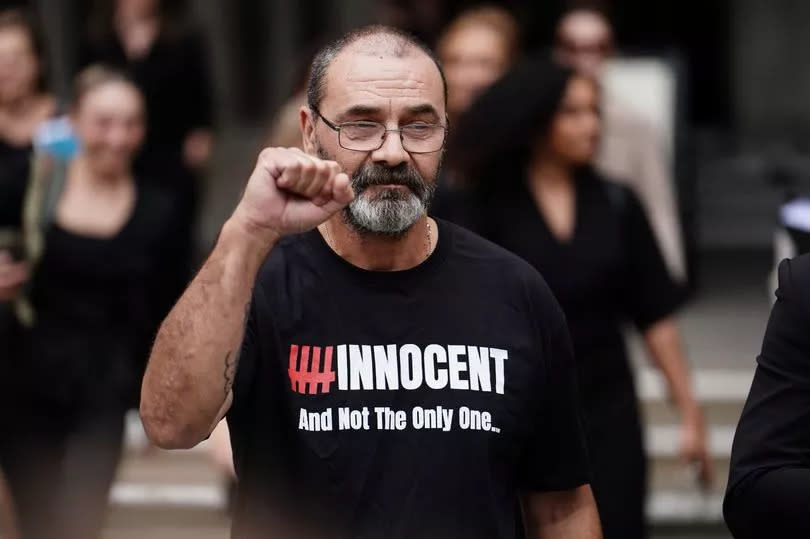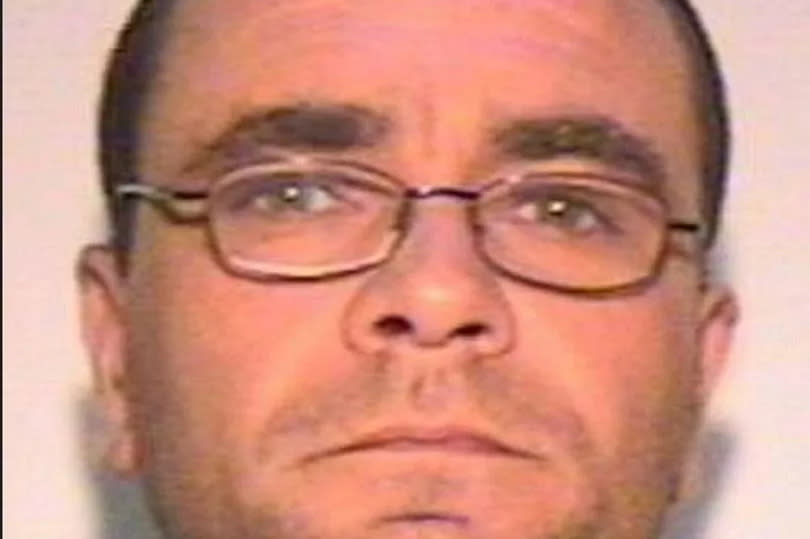"It's too little too late" - Andrew Malkinson rejects belated apology by the miscarriage of justice watchdog

The boss of the Criminal Cases Review Commission today offered an 'unreserved apology' to Andrew Malkinson for its handling of his case after he spent 17 years in prison for a rape he did not commit.
The watchdog which investigates miscarriages of justice twice turned down Mr Malkinson before eventually referring his case to the Court of Appeal. He branded it 'too little too late'.
Mr Malkinson, now aged 58, was 37 when he was found guilty - on February 10, 2004 - by a 10-2 majority of carrying out a violent sex attack on a woman by the M61 motorway in Little Hulton, Salford. He was convicted despite no DNA evidence.
READ MORE: Football manager sacked after three days is convicted rapist who attacked woman in Manchester flat
He was jailed for life with a minimum term of seven years, but served a further 10 more after maintaining his innocence. In July last year however, the Court of Appeal overturned his conviction after forensic testing linked another man to the crime.
His case was eventually referred to the Court of Appeal in the January by the Criminal Cases Review Commission (CCRC), which investigates potential miscarriages of justice, after the new DNA evidence was discovered. Then, in July last year, three top judges sitting at the Court of Appeal quashed his rape conviction, 20 years later.
Mr Malkinson has repeatedly called for the sacking of Helen Pitcher, the chairwoman of the CCRC who has now offered an 'unreserved apology'.
Following the apology, Mr Malkinson said he felt 'vindicated' but added 'it is too little too late'.
In a statement issued on his behalf by legal charity Appeal, he said: “The time for Helen Pitcher to apologise was last summer when I was exonerated. It was already crystal clear that the CCRC had completely failed me. Yet she’s held off on apologising until a report spelled this out for her in black and white. It is hard for me to see sincerity in an apology after all this time – when you are truly sorry for what you have done, you respond immediately and instinctively, it wells up in you.
“The CCRC’s failings caused me a world of pain. Even the police apologised straight away. It feels like Helen Pitcher is only apologising now because the CCRC has been found out, and the last escape hatch has now closed on them.
“The CCRC’s delay in apologising to me added significantly to the mental turmoil I am experiencing as I continue to fight for accountability for what was done to me.
“Last September, my lawyer wrote to Helen Pitcher directly requesting an apology. She replied saying she didn’t agree with many of our criticisms of the CCRC’s handling of my case and refused. That smacks to me of someone who is in denial and not fit to lead a body which is meant to be dedicated to rooting out failings in our justice system.
“I hope the Justice Secretary Alex Chalk will bring in new leadership at the CCRC. I am innocent and I am not the only one. Others must not be let down as I was. The CCRC should be led by people with empathy, humility, and a track record of fighting injustice.”
The apology comes after the completion of an independent review of the case by Chris Henley KC.
Ms Pitcher said: “Mr Henley’s report makes sobering reading, and it is clear from his findings that the commission failed Andrew Malkinson. For this, I am deeply sorry. I have written to Mr Malkinson to offer him my sincere regret and an unreserved apology on behalf of the commission.
“There may have been a belief that I have been unwilling ever to apologise to Mr Malkinson, and I want to clarify that this is not the case. For me, offering a genuine apology required a clear understanding of the circumstances in which the commission failed Mr Malkinson. We now have that.
“Nobody can ever begin to imagine the devastating impact that Mr Malkinson’s wrongful conviction has had on his life, and I can only apologise for the additional harm caused to him by our handling of his case.”
Mr Malkinson applied to the CCRC asking for his case to be referred to the Court of Appeal, but was rejected twice.

Ms Pitcher said the organisation would provide Mr Malkinson with a copy of the review report, which contains nine recommendations, and that it intended to make the findings public at a later date.
The review was commissioned before a wider inquiry into the case led by Judge Sarah Munro KC and Mr Henley’s report will be shared with the inquiry, the Crown Prosecution Service, Greater Manchester Police and the Independent Office for Police Conduct 'to ensure that the Commission does nothing that would compromise the integrity of the inquiry process or jeopardise the potential prosecution of an alternative suspect'.
Ms Pitcher added: “Once we have received clarity regarding the sharing and publication of Mr Henley’s report, I will arrange a meeting with Andrew Malkinson in person not only to discuss the report’s findings and recommendations and outline the steps we are taking to address them, but to offer him a formal apology on behalf of the Commission.
“I want to assure Mr Malkinson and the wider public of our commitment to rectify the mistakes made.
“Our aim is to enact reforms that prevent further injustices, such as those Andrew Malkinson has experienced, from ever occurring in the future. To that end, work has already started on implementing the nine recommendations outlined in Mr Henley’s review.”
The CCRC previously said it had identified 5,500 rape and murder cases before 2016 which it would review to allow 'new DNA testing' to identify an offender. The CCRC said 'initial work' suggested a quarter would progress to a second phase after some cases, for instance those where the identity of an offender is not challenged, had been filtered out. It could lead to 'several dozen' being subjected to the 'new' DNA testing, it said.
In July 2014, DNA laboratories in the UK moved to using a technique called DNA-17 which is said to be more sensitive than older types of DNA profiling. Old samples, degraded samples or samples which contain only a very small amount of cellular material are more likely to yield useful results using this testing method.
Mr Malkinson's legal teams says that, If the CCRC had begun this exercise back when DNA-17 testing became available in 2014, it could have spared Andrew Malkinson extra years wrongly imprisoned.

 Yahoo News
Yahoo News 
